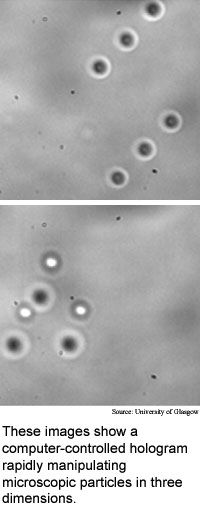
Hologram makes fast laser tweezer
One way to manipulate tiny particles like
single cells is to trap and move them using light, which has enough energy
to act like a wind at very small scales.
Researchers from the University of Glasgow in Scotland and the
University of Oxford in England have devised a way to use hologram patterns
to shape the intensity of different portions of a light beam so that several
different particles can be simultaneously trapped and individually controlled
in three dimensions.
The researchers devised an algorithm that works quickly enough
to control the light beam interactively with a keyboard and mouse. The
algorithm repeatedly refines the hologram pattern so that moving, adding
and deleting individual light traps does not require recalculating the
hologram as a whole. This makes it possible to control the light beam
in real-time.
Optical tweezers are already used as tools to, for example, hold
the ends of a muscle cell and measure its exertion force. More sophisticated
optical tweezers that offer better three-dimensional control of tiny objects
could drive pistons and valves to power labs-on-a-chip.
The hologram generator could be added to existing commercial optical
tweezers relatively easily, according to the researchers. The work appeared
in the the April 19, 2004 issue of Optics Express.
Photonic chips go 3D
Online popularity tracked
Summarizer gets the idea
Electric fields assemble devices
Briefs:
Process prints silicon on plastic
Tool automates photomontage edits
Device promises microwave surgery
Hologram makes fast laser tweezer
Chemistry yields DNA fossils
Particle chains make quantum wires

Research Watch blog
View from the High Ground Q&A
How It Works
RSS Feeds:
News
Ad links:
Buy an ad link
Ad links: Clear History
Buy an ad link
|
TRN
Newswire and Headline Feeds for Web sites
|
© Copyright Technology Research News, LLC 2000-2010. All rights reserved.